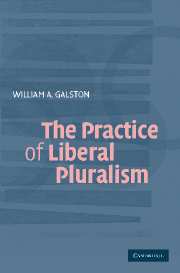Book contents
- Frontmatter
- Contents
- Acknowledgments
- 1 Introduction
- PART I PHILOSOPHICAL FOUNDATIONS OF LIBERAL PLURALISM
- PART II LIBERAL PLURALISM AND PUBLIC ACTION
- PART III POLITICS, MARKETS, AND CIVIC LIFE IN LIBERAL PLURALIST SOCIETIES
- PART IV DEFENDING LIBERAL PLURALISM
- 10 Liberal Pluralism and Liberal Egalitarianism
- 11 Liberal Pluralism Between Monism and Diversity
- 12 Conclusion: Liberal Pluralism at Home and Abroad
- Index
11 - Liberal Pluralism Between Monism and Diversity
Published online by Cambridge University Press: 18 December 2009
- Frontmatter
- Contents
- Acknowledgments
- 1 Introduction
- PART I PHILOSOPHICAL FOUNDATIONS OF LIBERAL PLURALISM
- PART II LIBERAL PLURALISM AND PUBLIC ACTION
- PART III POLITICS, MARKETS, AND CIVIC LIFE IN LIBERAL PLURALIST SOCIETIES
- PART IV DEFENDING LIBERAL PLURALISM
- 10 Liberal Pluralism and Liberal Egalitarianism
- 11 Liberal Pluralism Between Monism and Diversity
- 12 Conclusion: Liberal Pluralism at Home and Abroad
- Index
Summary
In this chapter, I continue to examine the major challenges to my account of liberal pluralism that have thus far emerged. These include claims, first, that my conception of liberal pluralism is inferior to rival understandings of liberalism that also rest, as mine does, on value pluralism; second, that value pluralism makes impossible any foundational or “comprehensive” liberal theory; third, that liberal pluralism is incompatible with democracy; and, finally, that value pluralism arbitrarily rules out the central claims of monotheism.
RIVAL CONCEPTIONS OF VALUE-PLURALIST LIBERALISM
As I have insisted throughout this book (and previously), my conception of liberal pluralism draws strength from the account of morality known as value pluralism. Still, fellow value pluralists offer accounts of politics that diverge sharply from mine. John Gray argues, in effect, that my politics is excessively prescriptive, so much so that it becomes inconsistent with value pluralism. By contrast, George Crowder argues that the political implications of value pluralism extend well beyond what I am prepared to affirm.
Gray's core thesis is that the morality of value pluralism leads to a politics of modus vivendi. The quest for “peaceful coexistence” is what is living in the liberal tradition today, not any particular specification of liberal rights, freedoms, or institutions. Isaiah Berlin was wrong to believe that value pluralism leads to, or is even consistent with, the endorsement of negative liberty (or for that matter any form of liberty) as a dominant human good, or to the vindication of liberty-protecting regimes as superior forms of political organization. Indeed, Gray insists, the range of good lives that human beings may lead is too wide to be contained in any one kind of political regime.
- Type
- Chapter
- Information
- The Practice of Liberal Pluralism , pp. 187 - 196Publisher: Cambridge University PressPrint publication year: 2004



